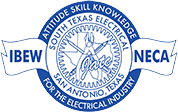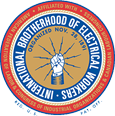Continuing Education and Upskill Training Opportunities
There are eight (8) recurring CONTINUING EDUCATIONAL courses scheduled each year, with each offered approximately twice per year (about 6 months apart). Additional trainings and courses may be scheduled and conducted in addition to the primary course offerings. Please check here or with the JATC office for current course offerings and registration information.
register online How to register
Available Classes
This course provides a comprehensive overview of conduit bending. The trainee will be exposed to all aspects of conduit bending, including tools, types of conduit and tubing, types of bends, conduit layout and installation, conduit threading, and various bending techniques. The student will gain familiarity in the three primary methods of bending; hand, mechanical, and hydraulic. The training teaches the student how to execute the basic bends such as 90’s, box offsets, three-point saddles, four-point saddles, kick 90’s, offsets and back-to-back 90’s. Students will also be introduced to advanced bends which include, concentric bends, parallel offsets, and more. Conduit bending is an essential skill, the takeaways from this class will make the participant a more productive contributor to the jobsite and a more valued member of the electrical workforce. Students must pass a final exam to receive credit for the course. Students who pass will be issued a completion certificate.
The reading and interpretation of blueprints are critical to project success. This course introduces students to the features of blueprints and how to design and interpret print sets so that they become proficient and effective blueprint readers. A dive into print structure, symbology, and circuit layout is presented. Students will be exposed to job costs, takeoffs, specifications, schedules, component location, and blueprint system integration. The learner will become familiar with residential, commercial, and industrial blueprints. Students must pass a final exam to receive credit for the course. Students who pass will be issued a completion certificate.
Many electricians are unfamiliar with the structure of the NEC and often find themselves confused and overwhelmed by its contents. Allow us to lift the vail of frustration and expose the code for what it really is, a logical and structured text. The code is not one book, but instead, its a collection of books; each one related to specific facets or applications of an electrical installation. Codeology teaches proven methods and strategies to develop and improve code navigation skills. The course is structured around the GENERAL-PLAN-BUILD-USE method of categorizing and locating code requirements. Students will become more proficient in solving code related problems, both in the classroom and in the field. Students must pass a final exam to receive credit for the course. Students who pass will be issued a completion certificate.
This course introduces students to the fundamentals of electricity and DC circuits, including electrical principles, theories, and laws. In-depth coverage of Ohm’s Law and the relationship between voltage, current, resistance, and power is explained. Circuit types, operation and circuit analysis is discovered and explained; this includes series, parallel, and combination circuits. Magnetism is also addressed in the course, along with an introduction to test instruments and electrical generation. Students must pass a final exam to receive credit for the course. Students who pass will be issued a completion certificate.
This course is designed to provide a comprehensive overview of the 2023 National Electrical Code. This class is ideal for any electrical professional including Journeyman and Master electricians, inspectors, and contractors. The class is centered around the “Electrical Systems” textbook which is based on the 2023 NEC. Guided by this authoritative text, students will benefit from concise text and descriptive illustrations as they take a deeper dive into the electrical Code and it application to wiring methods and materials, conductors and overcurrent protection devices (OCPD), branch circuits and feeders, grounding and bonding, transformers, services, special locations, code based calculations, and renewable energy systems. Important changes from the 2020 NEC to the 2023 NEC will also be covered and identified. Students must pass a final exam to receive credit for the course. Students who pass will be issued a completion certificate.
This class provides a deep dive into transformer operation, maintenance, installation and troubleshooting. Specific topics covered include principles of magnetism and electromagnetism, transformer operating principles, reactors and isolation transformers, auto transformers and buck-boost transformers, transformer overcurrent protection, tap rules, special transformers and connections, installation, maintenance and troubleshooting. Students must pass a final exam to receive credit for the course. Students who pass will be issued a completion certificate.
Motor Controls is designed to take the learner from the basics of motor control into advanced motor control topics through the use of three unique perspectives: 1. Magnetic Motor Control, 2. Electronic Motor Control, and 3. Advanced Motor Control. This systematic approach into the field of motor control will expose and educate the participant in control concepts, control equipment, installation theory and methods, maintenance, and trouble shooting. Students must pass a final exam to receive credit for the course. Students who pass will be issued a completion certificate.
This course is rooted in the 2023 edition of the NEC. It covers math related code topics such as ampacity, conductor terminations, continuous and non-continuous loads, box size, voltage drop, tap rules, motor installations, transformers, building loads, and electrical systems. This course develops a knowledge base and necessary skill set to achieve code compliant, adequate, and safe electrical installations. This training improves code users understanding and application proficiency in the challenging aspects of code-related arithmetic. This training is a great preparatory for both the Journeyman and Master licensing exam. Students must pass a final exam to receive credit for the course. Students who pass will be issued a completion certificate.





